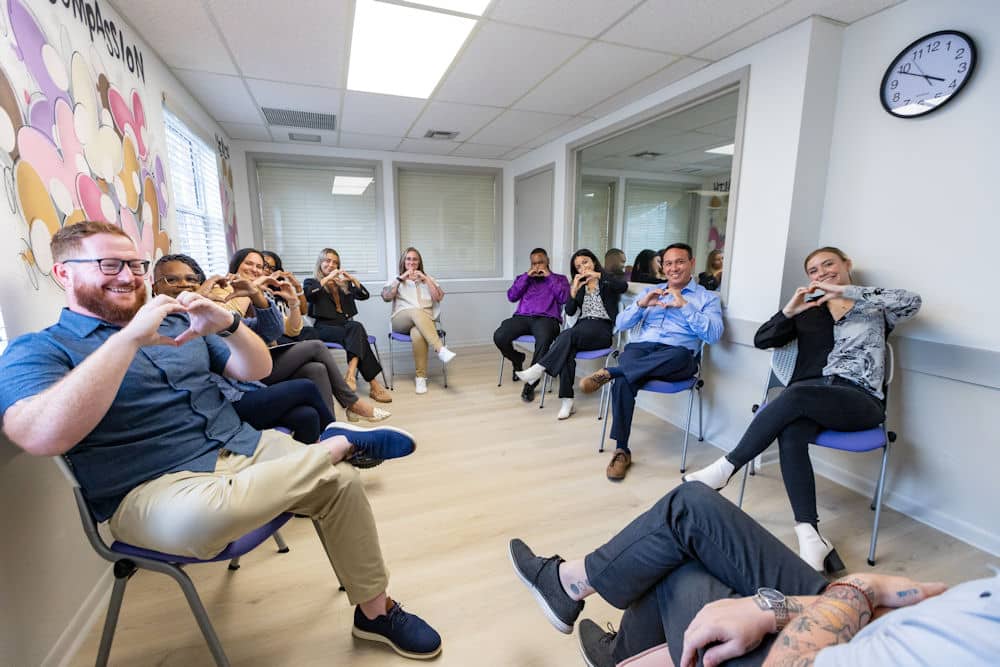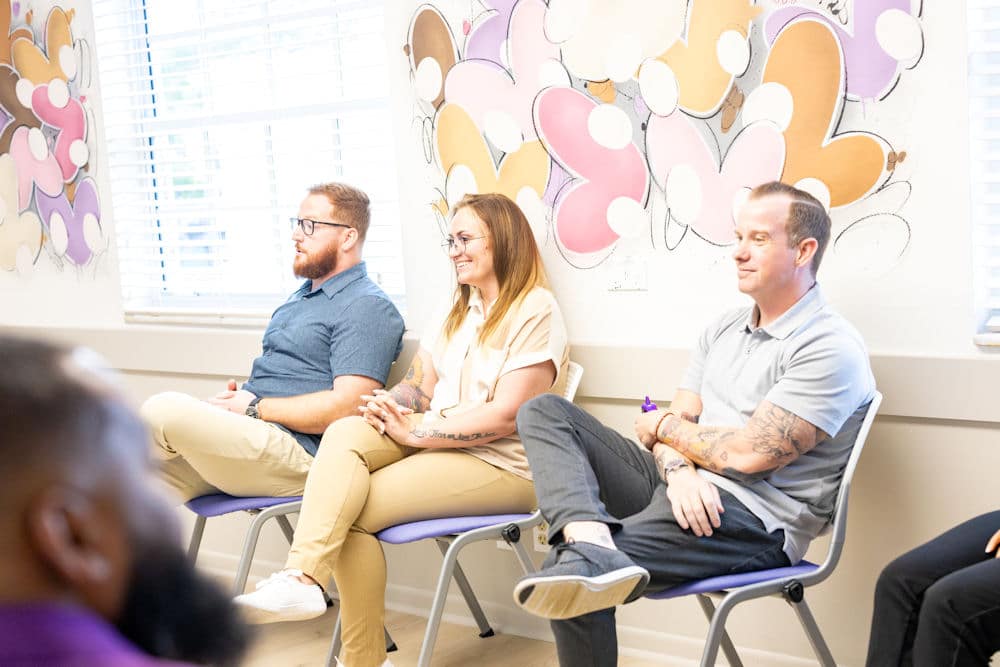Florida Therapy for Addiction and Mental Health
Embarking on the journey to recovery involves a multifaceted approach, and therapy plays a pivotal role in addressing both addiction and mental health challenges. At Agape Treatment Center, we offer a range of evidence-based therapies tailored to meet the diverse needs of our clients, fostering holistic healing and sustained recovery.
Therapy at Agape Treatment Center
Therapy is a pillar of addiction treatment. At Agape we offer many different therapies in order to provide well-rounded care and create personalized treatment plans for every individual who comes to us for help.
Individual Therapy
Individual therapy for addiction and mental health at Agape Treatment Center is a personalized and confidential exploration of the underlying factors contributing to challenges faced by individuals on their journey to recovery. In these one-on-one sessions, our clients work closely with a dedicated therapist to delve into their unique experiences, emotions, and thought patterns associated with addiction or mental health disorders. The primary goal of individual therapy is to provide a safe space for self-reflection, fostering a deeper understanding of personal struggles and identifying strategies for positive change.
Treatment involves tailored interventions, evidence-based modalities, and empathetic guidance to address specific issues, set achievable goals, and develop coping mechanisms. Our experienced therapists collaboratively work with clients to navigate the complexities of addiction and mental health, empowering them to embark on a path toward sustained recovery and improved overall well-being.
Group Therapy
Group therapy for addiction and mental health at Agape Treatment Center is a dynamic and supportive environment designed to foster connection, shared experiences, and mutual support among individuals on their recovery journey. Led by a skilled therapist, these participatory sessions bring together a small group of peers facing similar challenges. Group therapy provides a platform for open dialogue, where participants can express themselves, gain insights, and receive feedback in a non-judgmental setting.
Treatment involves a combination of psychoeducation, interpersonal exploration, and the opportunity to develop valuable coping skills within a community of understanding individuals. This collaborative approach allows clients to realize they are not alone in their struggles and provides a sense of collective strength. Through shared experiences and diverse perspectives, group therapy becomes a powerful tool in building resilience, fostering empathy, and reinforcing a supportive network crucial for sustained recovery from addiction and mental health issues.
Family Therapy
Family therapy for addiction is a specialized and inclusive approach that recognizes the integral role of familial dynamics in the recovery process. The primary goal of family therapy is to address the impact of addiction on family relationships, improve communication, and create a supportive environment conducive to lasting recovery.
In family therapy sessions, family members actively participate, engaging in open and facilitated discussions led by a trained therapist. The therapist works collaboratively with the family to explore underlying issues, enhance understanding of addiction, and identify constructive ways to support the individual in recovery.
Through this process, family therapy aims to strengthen relationships, build resilience, and foster a collective commitment to healing. Involving family members in the therapeutic journey is crucial for creating a cohesive and understanding support system, contributing significantly to the overall well-being of the individual undergoing addiction treatment at Agape.
Holistic Therapies
Holistic therapy is an approach that considers the entire person—mind, body, and spirit—when addressing mental health or addiction concerns. Rather than focusing solely on symptoms, holistic therapy recognizes the interconnectedness of various aspects of an individual’s well-being. This approach encompasses a diverse range of therapeutic practices, such as yoga, meditation, art therapy, music therapy, and other alternative modalities.
Holistic therapy aims to promote overall balance, reduce stress, and enhance self-awareness, emphasizing the importance of treating the person as a whole rather than isolating specific issues. It aligns with the belief that nurturing the body, mind, and spirit collectively contributes to a more comprehensive and sustainable path towards recovery and mental well-being.
Agape Treatment offers several holistic therapies include:
- Mindfulness and Meditation
- Yoga 12 Step Therapy
- Massage Therapy
- Hypnotherapy
- Art Therapy
Eye Movement Desensitization & Reprocessing Therapy
Eye Movement Desensitization and Reprocessing (EMDR) is a specialized therapeutic approach employed at Agape Treatment Center to address the impact of trauma on addiction and mental health. Particularly effective for individuals dealing with post-traumatic stress disorder (PTSD), EMDR involves guided eye movements or other bilateral stimulation techniques while recalling distressing memories.
This process helps desensitize the emotional charge associated with traumatic experiences, allowing individuals to process and integrate these memories more adaptively. EMDR aims to alleviate symptoms of trauma, reduce cravings, and enhance overall emotional resilience, providing a powerful tool within the comprehensive treatment plan at Agape.
Biofeedback Therapy
Biofeedback therapy at Agape Treatment Center is a cutting-edge, non-invasive technique that empowers individuals to gain control over physiological responses related to stress and mental health. During biofeedback sessions, clients are connected to sensors measuring physiological functions such as heart rate, muscle tension, and skin temperature.
Real-time feedback is then provided, enabling clients to learn how to consciously regulate these bodily functions. Biofeedback is particularly beneficial for stress reduction, anxiety management, and addressing physical symptoms associated with mental health or addiction issues. By enhancing self-awareness and promoting self-regulation, biofeedback therapy contributes to a holistic and integrative approach to mental well-being at Agape.
Rapid Resolution Therapy
Rapid Resolution Therapy (RRT) is a brief and integrative therapeutic approach designed to address emotional and behavioral challenges, including those related to trauma, anxiety, and addiction. Developed by Dr. Jon Connelly, RRT aims to quickly and effectively resolve the lingering impact of past traumatic experiences by reframing the way the mind processes these memories.
In RRT sessions, the therapist utilizes a combination of language-based techniques, guided imagery, and hypnotic elements to facilitate a shift in perception and break the emotional ties to distressing memories. Unlike traditional talk therapies, RRT does not require clients to extensively revisit or re-experience traumatic events, allowing for a more comfortable and efficient resolution process. The approach is known for its speed, effectiveness, and the potential to bring about lasting positive changes in a relatively short time frame.
At Agape Treatment Center, our experienced and compassionate therapists work collaboratively with clients to create personalized treatment plans. Sessions are designed to empower individuals, fostering a deep understanding of themselves while building essential skills for sustained recovery from addiction and mental health challenges. Our therapeutic approach embraces each person’s unique journey, providing a foundation for lasting transformation and well-being.
How Does Therapy Aid in Addiction Treatment?

Therapy plays a crucial role in addiction treatment by providing individuals with a structured and supportive environment to explore the underlying causes of their substance use, address distorted thought patterns, and develop effective coping strategies. Various therapeutic modalities, such as individual therapy, group therapy, and holistic approaches, contribute to the comprehensive treatment plan.
Therapy helps individuals identify triggers, navigate cravings, and build resilience, fostering self-awareness and emotional regulation. Additionally, therapy offers a platform for clients to work through co-occurring mental health issues, facilitating a holistic approach to recovery. The therapeutic relationship allows for trust, empathy, and collaboration, which empowers individuals to break free from the cycle of addiction and cultivate the necessary skills for sustained recovery.
How Long Should You Go To Therapy for Addiction?
The duration of therapy for addiction varies widely and is influenced by several factors, including the severity of the addiction, the presence of co-occurring mental health issues, individual progress, and treatment goals. Generally, individuals may engage in therapy for addiction on both a short-term and long-term basis.
Short-term interventions, such as brief counseling or crisis intervention, can be effective for specific issues or as part of an early intervention plan. Long-term therapy, including individual and group sessions, is often recommended for individuals undergoing comprehensive addiction treatment. This may extend over weeks, months, or even years, depending on individual needs and the evolving nature of the recovery process.
Many individuals continue with ongoing therapy as a form of aftercare and support even after completing more intensive treatment programs. Ultimately, the duration of therapy is individualized and flexible, adapting to the unique needs and progress of each person in their journey to recovery from addiction.
Tailored Addiction Therapy at Agape Treatment Center

At Agape, we know every individual has unique circumstances and treat our clients accordingly. Tailored addiction treatment, including personalized therapy, is crucial for addressing the diverse and individualized needs of those seeking recovery.
At Agape Treatment Center and other addiction treatment centers in Florida, recognizing the unique factors contributing to each individual’s addiction is fundamental. Personalized treatment plans take into account the specific substance abuse history, co-occurring mental health concerns, and individual strengths and challenges.
This personalized approach not only enhances the effectiveness of addiction treatment but also fosters a sense of empowerment and engagement in the recovery process. Agape Treatment Center, in particular, prioritizes individualized care by offering a comprehensive range of evidence-based therapies, ensuring that each client receives the support needed for lasting recovery and overall well-being.
Contact Agape Treatment Center for Addiction Therapy in Florida

If you or a loved one are seeking therapy for addiction, Agape Treatment Center is a premiere facility for addiction treatment in Fort Lauderdale, FL. We offer several unique types of therapy that are all highly effective in treating substance use disorder. Call us today and start your recovery with Agape!
- March 13, 2024
- Updated Date: October 18, 2024
Discover Programs

Stephanie Robilio is an accomplished Clinical Director at Agape Behavioral Healthcare. With a Master of Social Work degree, LCSW license, and extensive training in Rapid Resolution Therapy under her belt, she brings a wealth of expertise to her role. Her unique combination of education and experience allows her to provide exceptional care to clients and lead her team with confidence. Stephanie’s joy comes from witnessing the moments when her patients creatively connect the dots and bravely move toward reclaiming their power. Her purpose is to help individuals understand their past so they can create a future full of hope, growth, and success. Stephanie attributes a large portion of her success to the supportive culture and strong sense of community fostered by the Agape team.



